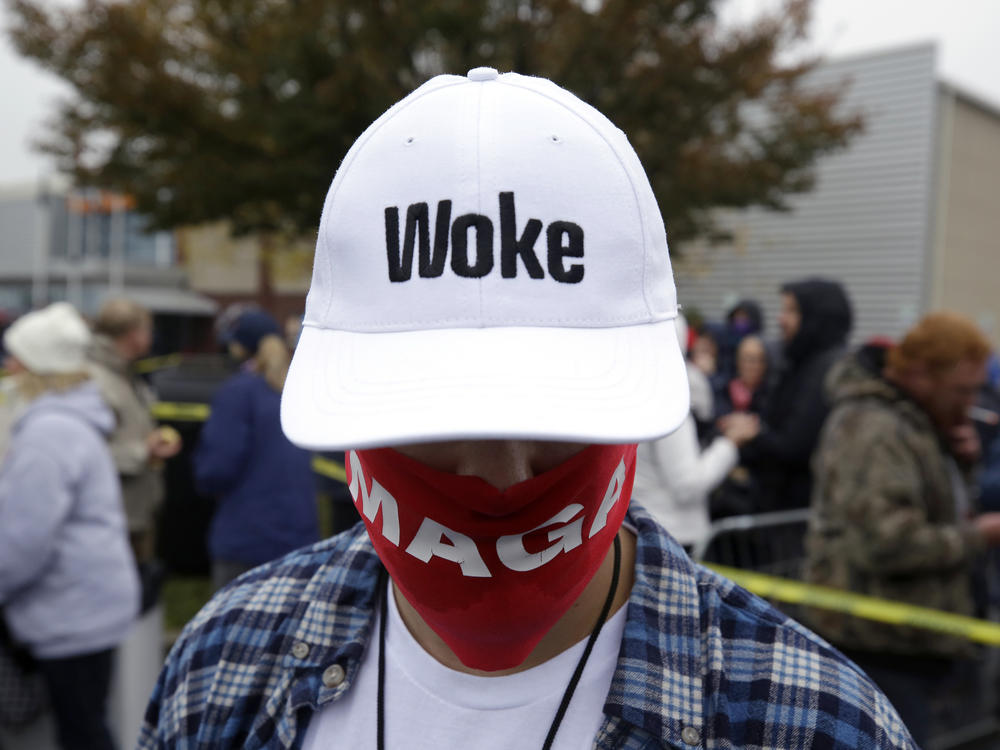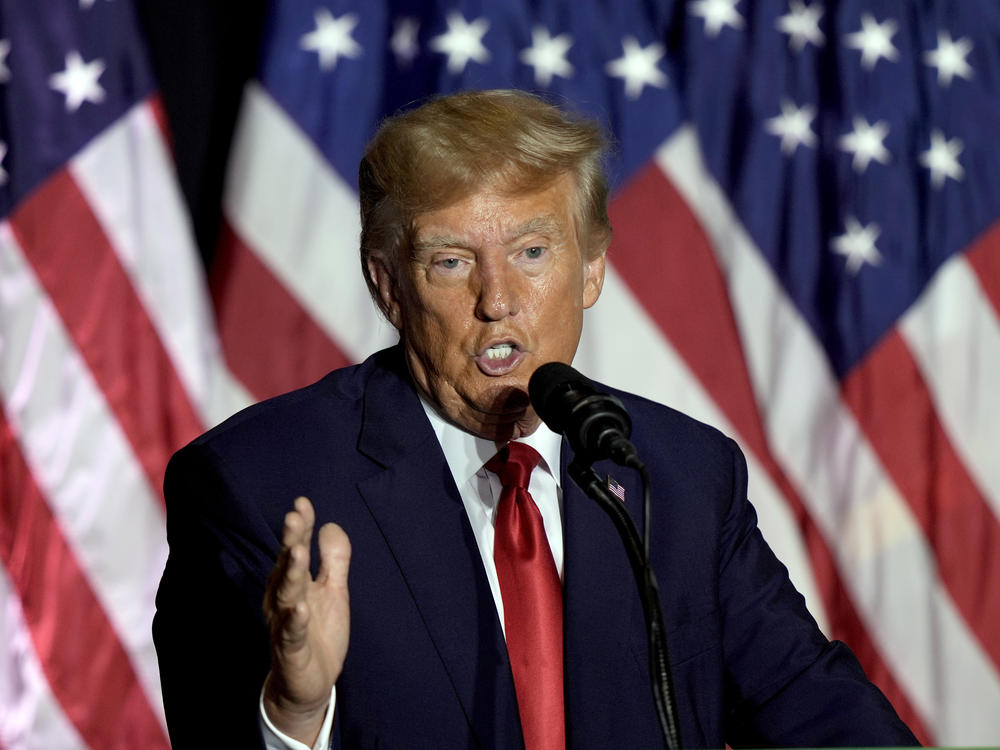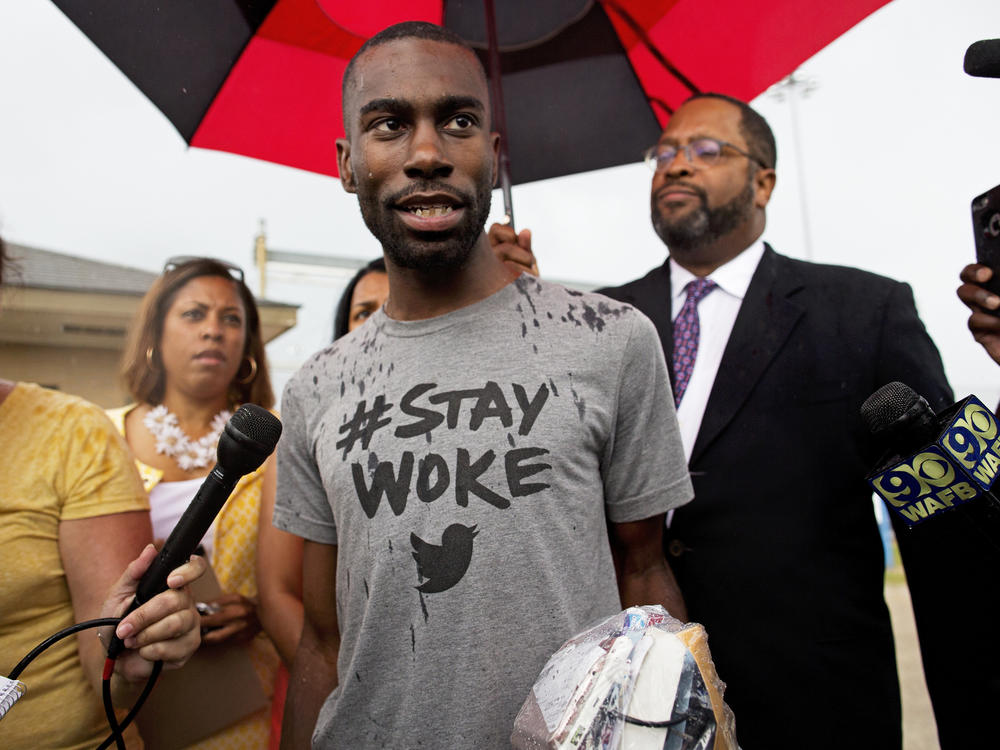Section Branding
Header Content
Republicans can't stop using the word 'woke'. But what does it really mean?
Primary Content
There's one word on the Republican presidential campaign trail that's hard to avoid — "woke."
Republicans on the campaign trail are using it as something of a catch-all to criticize anything on the progressive side of the political spectrum they don't like — whether it's teaching about racism in schools or gender transition policies or even books in libraries they deem inappropriate.
But the term didn't originate with Republicans — or this round of the culture wars.
"It comes out of Black culture," explained Elaine Richardson, a professor of literacy studies at the Ohio State University. Richardson co-authored an academic paper examining the word's use in the Black Lives Matter movement.
"In simple terms, it just means being politically conscious and aware," she said. "Like 'stay woke.' "
How it's being used
Despite that, Republicans have co-opted the phrase and it's become the word of the GOP primary.
"We have made Florida the state where woke goes to die," Florida Gov. Ron DeSantis said at a recent event in Virginia. "The woke mind virus represents a war on merit. It represents a war on achievement."
He's repeated that almost verbatim elsewhere, too.
No other candidate has made anti-"woke"-ness more central to their candidacy than DeSantis. He's repeated the word over and over and over again at nearly every campaign stop.
As governor, he implemented conservative policies that he's branded as anti-woke. After winning reelection last fall, he made it central to his messaging, foreshadowing the central thesis of his presidential bid.
"We have embraced freedom. We have maintained law and order. We have protected the rights of parents. We have respected our taxpayers, and we reject woke ideology," DeSantis said during his victory speech after his reelection, hinting at his own definition of what woke is — and isn't. "We fight the woke in the legislature. We fight the woke in the schools. We fight the woke in the corporations. We will never, ever surrender to the woke mob. Florida is where woke goes to die."
He has repeated the second half of that quote often on the campaign trail. And his use of it has forced it into the lexicon of the primary with other candidates using it, too.
Former President Donald Trump has said he doesn't like the term, but he has used it repeatedly himself.
"I don't like the term woke because I hear woke, woke, woke, you know, it's like just a term they use," Trump said. "Half the people can't even define it. They don't know what it is."
But just hours after making that statement, he used it multiple times in a town hall on Fox News.
"A lot of things going on with our military, with the woke and all this nonsense," he said. "They're not learning to fight and protect us from some very bad people. They want to go woke. They want to go woke."
There are other candidates who also don't like the focus on the term.
"I believe that the president of the United States has got to define a set of things they're supposed to work on, and it's not every culture war topic," North Dakota Gov. Doug Burgum said on NBC's Meet the Press.
He's not alone, but he's also in the minority in his party and has minimal support.
Former tech CEO Vivek Ramaswamy has written two books on it, crusading particularly against diversity-based hiring practices and socially conscious investing by companies.
"I think it is inherently divisive to tell us that we're nothing more than the characteristics we inherit on the day we're born," he argued on CNN. "That divides us on the basis of race and sex and sexual orientation."
The word has been co-opted and has a long history
"Woke" was used in Black protest songs dating back to the early 20th century. There is debate about its origins, but as far back as 1938, singer Huddie Ledbetter, better known as Lead Belly, used the phrase in a recording of an afterword of his song, "Scottsboro Boys," to warn of potential racist violence against Black people in the South.
"I advise everybody, be a little careful when they go along through Alabama — stay woke, keep their eyes open," Ledbetter said in what's believed to be the first audio recording of someone using the phrase "stay woke."
The Scottsboro Boys were nine Black teenagers who are accused of raping two white girls in what is widely seen today as one of the worst cases of racist legal injustice. It helped spur the civil rights movement and loosely inspired the book and movie To Kill A Mockingbird.
"It comes out of the experience of Black people of knowing that you have to be conscious of the politics of race, class, gender, systemic racism, ways that society is stratified and not equal," Ohio State's Richardson said of the expression.
The phrase came back into popular use in 2008 after Erykah Badu's song Master Teacher. Donald Glover, aka Childish Gambino, used it in his song Redbone in 2016.
At other times, though, the seriousness of the word has been diluted, used facetiously and ironically on social media.
Modern Black activism and the Black Lives Matter movement, though, used it widely as a rallying cry.
"I think that the Black Lives Matter generation really put the word back in popular consciousness, even though it was never really gone, because it's always in just community parlance," Richardson said. "In the Black Lives Matter movement, the word, I think, reached another level of popularity with people saying 'stay woke.' That hashtag was really popular."
But there's a straight line between the use by Black Lives Matter activists and Republicans using it now. For conservatives, the culture of protests in the streets — and violence, at times — was emblematic of what they don't want to see in the country.
It's something that's been seen many times over the last American century, including and especially during the civil rights movement of the 1960s and the anti-war movement of the 1960s and 1970s.
"People who are interested in keeping the hierarchy and the social inequality the way that it is and not trying to level the playing field or not trying to have social inequality, one way you can do that is through controlling language, through controlling how people think about ideas," Richardson said. "And it's actually stripping — it's trying to strip Black people out of their history, out of our lived experience, our identity."
She also sees dangers in how Republicans are using the phrase, warning that it could lead to violence, like recent cases in which Black people have been shot knocking on a door, for example.
"It promotes anti-Blackness," Richardson argued. "It promotes stratification. It promotes fear. And that's very dangerous."
Conservatives don't see it that way — and show no signs of curtailing its use on the campaign trail. Badu was asked about Republicans using the phrase and in particular DeSantis' quote that "Florida is where woke goes to die."
"I think they mean Black," she said on MSNBC earlier this year. "Yeah. It's another way to say 'thug' or something like that. It is what it is. It doesn't belong to us anymore, and once something goes out into the world, it takes on a life of its own."
Copyright 2023 NPR. To see more, visit https://www.npr.org.




